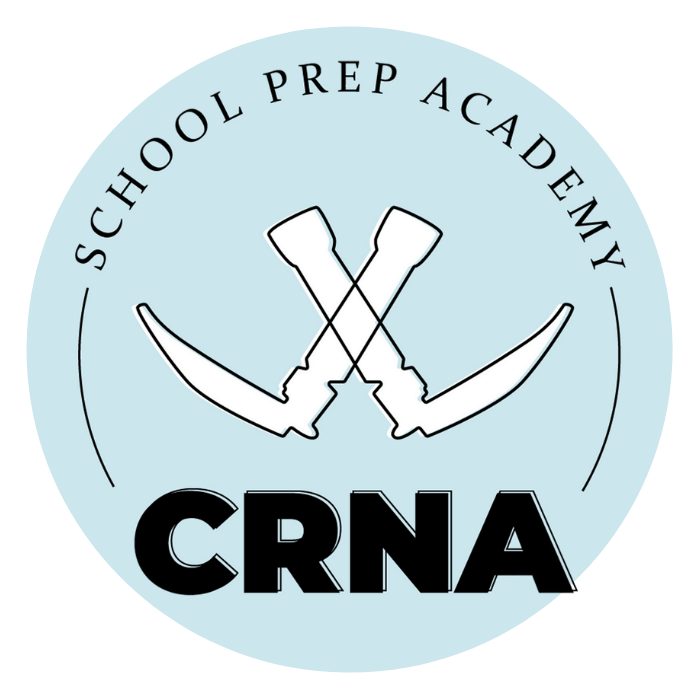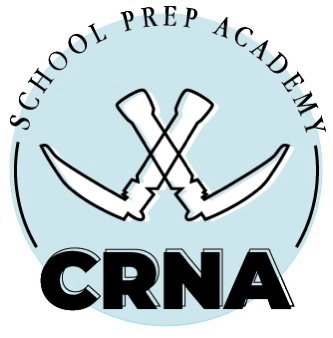
Dismissal from a CRNA program?! We sure don’t want that to happen to you! But as promised, our podcast strives to provide all of the information that can possibly be needed. And difficult situations that no one wants, such as needing readmission into a CRNA program, are something that does happen and something that needs guidance and support from the right people. That’s why, for today’s episode, we’ll be talking about the things you can do if this happens to you, and ways to prevent it from happening in the first place.
Get access to planning tools, mock interviews, valuable CRNA Faculty guidance, and mapped-out courses that have been proven to accelerate your CRNA success!
Become a member of CRNA School Prep Academy here: https://www.crnaschoolprepacademy.com/join
Book a mock interview, personal statement critique, resume review and more at https://www.TeachRN.com
Join the CSPA email list here: https://www.cspaedu.com/podcast-email
Send Jenny an email or make a podcast request! Hello@CRNASchoolPrepAcademy.com
—
Watch the episode here
Listen to the podcast here
Getting Dismissed From CRNA School… Now What?
In this episode, we’re going to discuss maybe a topic that’s not so fun to discuss, which is what happens if you get dismissed from CRNA school. I’m bringing this into the world because this is going to happen. I sure as heck hope it never happens to you, but either way, I want to make sure this information is out there in the world.
In my three years of mentoring students, I have had a handful of students who have come to me after this has occurred. They’re seeking guidance and support as far as how to move forward with getting re-admission into CRNA school. I wanted to at least put it out here. I am sure as heck hopeful that this never happens to you, but either way, I want to make sure that this knowledge is known as far as what the next steps should be if this were to occur.
I also want to make it very known as far as some considerations for you to be well aware of prior to even selecting the CRNA school you want to attend. Before you start the program, there are some things that you need to be well aware of. One of those includes reading your student handbook. The beauty of a student handbook is I have found that you can find a lot on Google. You can find these student handbooks in PDF format on Google. Your school will give this handbook to you, and you should be reading your student handbook prior to starting the program. If you’re curious, go ahead and do a Google search. See if you can find it on Google. It may be out there. It may not, but it’s worth looking for. I have found quite a few myself through Google.
Grading Policies
I want to share with you some things you should think about prior to selecting your CRNA program. One of those is what their grading policy is as far as what is their “passing rate” for their courses. I’m not trying to freak you out. I hope that’s not what’s going to occur. I simply want to point out the differences between the CRNA programs and also give my thoughts on why there’s such a big variation in this. I don’t know if this is set in stone. This would be a great question, honestly, to address on our upcoming faculty episode to see what their take is on this type of situation.
Schools all have a different passing percentage or grading scale for the passing of their courses. Some have variations such that you’re allowed one Cs. Some are no Cs. Some are that you can get Cs in Basic Sciences, but you can’t get any Cs in Anesthesia courses. It’s all across the board as far as differences in what their grading policy is. That’s one nuance I want to point out that schools are all a little different. As far as why this is, I don’t know. I was honestly shocked when it came to my awareness.
A few years ago, I noticed this difference, so I asked a bunch of students inside a private Facebook group who were students to share what their grading policy is. I wanted to see, “What else do I need to learn about this? This seems like a nuance that people should be aware of.” I’m going to go ahead and read through some of these comments. There were 93 comments on here. Not all of them were back-and-forth comments, but still, I got a good handful of people responding on what their grade policy was.
This first one said that it was 86% where they went. They had to maintain an 86% in their coursework in order to pass. I don’t know if the first one was Scranton, but 86% has come up for a second time, and that was Scranton. North Shore is 86%. In the personal program where I went, they allow one C in the entire program. If you ever get more than one C, you’re out. Otherwise, you have to maintain a B or better in all of your coursework, but they do allow one C. That was my program. That was a while ago. I graduated in 2014, so I don’t know if it has changed. This was Akron.
Even with all of this, please make sure that you know their updated policy. Don’t take my word for it. I’m trying to share the variations that are out there. All programs are different. This program says a 3.0 total/cumulative after each semester is required. I don’t know what program this is. They didn’t say. This next one says 80%. Some classes have an 80% passing rate, while some require an 82% or 84%. It depends on the class for this program. In ECU, the GPA is at 3.0 or greater. You can get some Cs but must be a B or better in all Anesthesia courses. In Basic Science courses, you’re allowed to get a C, but no Cs are allowed in actual Anesthesia courses. That was ECU.
This program in TCU is 82.5%, or you’re out. That’s what they said. They said they would not round it up. That was also a comment that was made. SIUE is 85%. They do allow one C. Lourdes is 83%. FIU in Miami is 85%. Knoxville is 3.0. You’re allowed one C in a DNP core course only. 87% is passing. 80% to 86% is considered a C. You are allowed two of them but will have to retake one of those courses at the director’s discretion. This is CAMC in West Virginia. 87% is passing. 80% to 86% is considered a C. You’re allowed two of those but will have to retake one of those courses at the director’s decision or discretion. This was all posted a few years ago, so it’s pretty current as far as their policy. Always double-check that it could have changed. I don’t know.
The University of Maryland is 80% or higher to pass. In Newman, you can have two Cs, which is an 84% or less. If you have three Cs, a D, or less than a 3.0, you are dismissed. That’s Newman. Arkansas State is 84% or higher in anesthesia classes and 74% or higher in Basic Science. That’s Albany Medical College. Fairfield is 83% in all courses. MTSA is 80% or above. You are allowed two Cs. At this point, I said, “This is nuts. I had no idea they’d be so different.” I was shocked. I was like, “This is all over the place.”
Duke is 83% and has no opportunities to remediate. That means they don’t have a remediation policy. That’s going to be the next thing I go into. It’s whether your school has a remediation policy and what that is. At the University of Alabama, it is 80%. FranU is 80%. You’re allowed one C if your GPA is greater than 3.0. It is 83% in Texas Christian and 84% in UT Chattanooga. This one is 82.5% with no Cs and no remediation. This person said 83%. I don’t know what program.
In Webster, you get one C. On the second, you’re out, and then pretty much, you have to get above 80%. For some courses, you have to maintain 80%. In others, you have to maintain 83% or higher. She even said others are 84% in some classes. It sounds like it depends on the class and what they expect. That’s interesting. I’ve never heard of that before. That’s odd. That would be hard to keep track of.
It is 85% in MUSC. You’re allowed one non-passing grade, but they will work with you if you’re having trouble. Apparently, no one’s been kicked out over grades in years. They’re very supportive. Lourdes is 83%, and only one B minus is allowed throughout the entire program. That’s pretty strict. In Wisconsin, it is 84%, with no Cs allowed. It is 82% in Southern Mississippi and has no Cs.
In South Florida, it is 84% up with no Cs or B minus for two years in a row and a 100% passing rate in the first-time board. Eighty percent is passing, which is a B for us. We can get Cs on tests or assignments, but not for any class as a whole. For 80%, you can repeat one core class on a probationary basis. Unfortunately, they didn’t answer what program that was. I believe this is Frank J Tornetta, which is 84% to pass courses and remain in the program. You need to have no B minuses and no Cs but also maintain a 3.0 to remain in the program.
This one’s Augusta, which is 80% to pass exams in the class. As long as you get 80% in the class overall, you can get less than a B on an individual exam. I believe you can get one C in a DNP course. This other person says 80%. As long as you maintain a 3.0, you can get some Cs in the Basic Science classes, not anesthesia. South College is 80% or above in all courses.
UTK, which is the University of Tennessee, requires an 83% minimum to pass concentration specific to DNP courses. Only one C is allowed in a DNP course. I went through a whole bunch of different grading policies. It’s very different. It’s not that you have to pick your program based on this, but I do think you should be well aware of this prior to entering your program. It should be at the forefront of your brain that you have to know exactly what to do to maintain good academic standing within these schools.
Ultimately, if you had the choice between two schools and were accepted at both, and one had a little bit more lenient grading policy and maybe a remediation option, if all things were equal, I’d go with that. At least it makes you feel a little bit more secure. I don’t know if that’s the best advice. I’m speaking from my own point of view on that and also from a faculty point of view. I asked Dr. Wilson about this because I was like, “What is going on?” I would equally be very interested to see other program faculty’s opinions on why this varies so highly.
What he pointed out was that all these schools know what success looks like academically to pass boards for their program. I know you know this to be true that all college courses are vastly different as far as intensity and types of testing and quizzes. All the things that go into that grade are different per course. It can vary from school to school. That means one anatomy Pathophysiology course can look vastly different from another anatomy Pathophysiology course. One may be rigorous, where the passing grade is an 80%, but the other one may not be as rigorous, but the passing’s 86%. They know their benchmarks. They know that a student who scores X percent in a certain course tends to still be successful when it comes to passing boards.

I know you’re probably sick of hearing me say board passing, but that’s what this is all about. These schools want you to pass boards. It helps them keep their doors open. That’s the main thing they’re scrutinized for. When they look at the accreditation body to remain an open college, they look at passing rates. These schools, with a lot of scrutiny, look at what it takes on their student level and break it all down to know what a successful student has to be in order to pass boards the first time. If that means 86% in all courses, then that’s 86%.
In other schools, you’re like, “We can let them slide on a DNP course. We can maybe let them slide on Basic Science, but all Anesthesia courses have to be at least a 3.0.” Based on their data and their stats, they know that that’s what it takes for a student to be successful in passing boards in their program. This all goes into saying that schools make up these grading policies with data and stats to back their decisions. I don’t think it’s to be unfair. I don’t think it’s to be because they want to be harder than all the rest or easier than all the rest. They do it knowing that they’re setting the benchmark for what the students need to achieve in order to be successful in passing boards.
Remediation Process
Being aware of that is good to know. I would’ve had no idea if this had not been brought to life. The fact that I mentor students from all across the country, I wanted to make sure I pointed it out. The other thing is the remediation process. I know you heard me mention it earlier. Some schools do not have any. What a remediation process is if you don’t meet that minimum and you are dismissed from the program, is there any way to get readmitted into this program? If so, what would that look like?

The vast majority of schools don’t tend to have a remediation process. The other half does. That means depending on the reason as to why you were dismissed, there could be a chance of you being able to get readmitted if you do X, Y, and Z. With that being said, depending on the reason, if you’re dismissed from CRNA school for plagiarism or cheating, it is pretty unlikely you’re ever going to get readmitted for the most part. That’s taken with the utmost seriousness. It’s also going to be hard to ever overcome to get readmitted to a program if you have truly plagiarized or cheated. Don’t do it.
With all that being said, I had someone who had no intentions of cheating. It wasn’t like this person intended to cheat, and she got called out for cheating. Here is the background on that. It ended up being okay. I know this is a happy ending story I’m telling you, but I don’t think it ended up being a happy ending for the other person involved in this because they truly were cheating.
It’s not that they were old, but as an upperclassman, incoming classes were like, “Do you have any study resources to share with me that would help me?” They had been assigned to buddy up a little bit when it came to taking underclassmen under their wing. Some materials were shared from a lab assignment, for example, on medications and looking up all the stuff on medications. It was shared, not in a sense to give them to use to cheat, but like, “Let me help you. Here’s study material.”
The person who shared didn’t give that to the person to plagiarize or cheat with it. It was more to help. Unfortunately, it was taken as a complete verbatim copy. It was pretty blunt. It’s like you submitted someone else’s work. They both got in trouble for it. Both were on the chopping block as far as dismissal. The one who submitted it did get dismissed. The one who shared it had no intention and was like, “I didn’t do this to cheat.”
I genuinely did not think that they were trying to do anything wrong. They thought part of the assignment was to buddy up with big sibs and little sibs and help. I don’t know the whole background, but long story short, this person was able to stay in their program. It did take some months of dealing with this and not being sure. They got kicked out of clinical. They had to go makeup all their clinical hours. I know they had to get some lawyers involved.
It was a mess with the dean of the college and all this stuff. It was not a simple process. It was incredibly stressful to the point where this person told me, “I have to consider a different career.” She was six months away from almost graduating. Can you imagine the gut-wrenching experience? I was incredibly thrilled to see that she was able to graduate. With all that being said, don’t cheat. Don’t plagiarize.
Don't cheat. Don't plagiarize. Because that's going to be a really hard thing to ever come back from. Click To TweetWith grades, this is probably the most common reason people get dismissed from their CRNA schools. Depending on your school, there may or may not be a remediation process. That could look like retaking the course, or it could be like, “We don’t have a remediation process. You’re out.” If that’s the case, they also had a student whom they dealt with him. He did a remediation process and retook the course. He got back into the program, had another mishap academically, and got kicked back out.
I don’t know how else to describe this. I don’t know all the details as far as what happened exactly, but ultimately, if you are given a second chance, not to put more pressure, it’s of the utmost importance that you openly communicate if you’re struggling. If you get a second chance, that’s your chance. Keep that in mind. I don’t know the future of that student if they’re going to be able to get readmitted somewhere else.
They’re no longer going to be able to continue at the school that gave them the remediation. They’re flat-out out of the school at this point. They’re going to have to try to get into a different program. Since they’ve been given a second chance and they still didn’t succeed, it’s going to be that much harder to ever find another program that is going to give them a chance.
What I want to discuss with you and what to do if you don’t have a remediation process at your school is you have to work with your program faculty on this. If you want to get into another school, the best shot you have is to take the advice they give you from your current faculty and take it to heart. Retake that course you didn’t do well in. Retake another course that you think would be enriching and would back you up a little bit. In particular, there was a student to whom this happened. He tried for two years. He has multiple faculty meetings. He had multiple one-on-one consultations with our faculty through CSPA. He met with a program to which he wanted to apply. He left in good standing with the other program and got recommendations from that program.
He interviewed but didn’t follow through with some advice he was given from the program he was interviewing for and didn’t get in. He felt defeated and almost gave up again because he was already dismissed from a CRNA program before. He was like, “I just didn’t listen to the advice they told me. I’m going to go back, and I’m going to do it. I’m going to show back up. I’m going to re-interview,” and he did. He got in. It is a happy story. It was a long road, but he did it. He’s in school. He’s doing great. I hope to someday bring him on the show, but I want to make sure he graduates and gets past all that.
Guidance And Help
With that being said, it’s important for you to work with your current program faculty to make sure that if they have advice or guidance for you, you’re able to do that. You’ll also leave on good standings such that they’re willing to talk to other program faculty to consider you for admission. That is by far the best thing you can do. I feel bad when students reach out to us and want us to help them. I’m like,
“I am not going to be able to help you the way that your program faculty can help you. That is where the guidance and help need to come from. It is straight from them.” You’re going to be somewhat at the mercy of how they are going to be able to help you going forward. Are they going to be able to write you a good reference letter? Did you leave in good standing?
The big take-home message is if this were to happen to you, your professionalism through the whole thing is so vital. If you get an attitude or if you get defensive, or if you get angry, are they going to want to help you? I don’t know. The rules are rules. If the rules didn’t get followed or they got broken, to lash out at them when they’re following standards that are set for everyone, you got to think about that. I get it. You’re angry. You’re frustrated. Go home. Get mad. Get it all out. Don’t go into the office hours mad at the faculty. Essentially, you got to take ownership.
If this were to happen to you, your professionalism through the whole thing is so vital. If you get an attitude or if you get defensive, are they going to want to help you? Click To TweetIt’s not like you are a bad person for this. Please don’t take it that way. Life happens, and stuff comes up. For most of the students I talk to who have academic issues, there’s usually something pretty significant going on in their life, whether that would be personal or with family or something of that nature. They try to tough it out and get through, and it backfires.
For me, the biggest takeaway from all of this for you reading is if you’re in school and you foresee any major issues that come up, whether that would be personal, with your family, or academically, you have to reach out early before you get that grade. You have to say, “I didn’t understand this. I didn’t do as well on this midterm or this quiz. Maybe I need to investigate deeper.” See if they let you come to office hours to review old tests. Some schools do, and some schools don’t.
This could be a good question to ask in an open house. You’re like, “Do you allow the students to review old tests?” My program allowed it, but the program director had to be in the office. There were no phones allowed to be out. You could sit there, review your own test, see the answer bank, and gauge, “That was the right answer? That’s interesting.” It allows you to see where your shortcomings were and what the actual answer was. It allows you to think through the rationale behind the right answer. Not all schools allow that. That would be a great thing to understand that that’s a potential option for you if you’re in school.
You got to work with your program faculty. You have to let them know, “My mom’s sick. She’s in the hospital. I didn’t sleep last night. I know we have a midterm coming up next week, but is there any way I can get one more day to prepare for this? I don’t want to mess this up, and I equally felt like I had to be there for my sick mother.” Whatever it is, you have to be upfront and tell them whether you’re going through some personal struggles. Maybe you’re dealing with some major anxiety and depression. Whatever it may be, you have to be upfront and honest because you can’t struggle alone in silence and have something bad happen.

Once the grade is formed or on paper, there’s nothing they can do for you. These are the rules. These are the standards we hold everyone to. I’m sorry. If we bend the rules for you, we’d have to bend the rules for everyone. That’s the way it goes. It seems harsh, but it’s not meant to be. It’s because it’s a boundary. It’s a standard. Boundaries are not meant to be broken. That’s all this is at the end of the day. It’s your responsibility as a student to reach out early and often if you’re having some type of issue. That was a mouthful.
If you’re too shy or embarrassed to go to the program or faculty, go to your classmates. Get support somewhere. I highly encourage you to at least find one faculty that you are on a friendly, comfortable basis, someone you feel like you can confide in. I know for me, there was probably at least one person I connected with as far as faculty. She was a breath of fresh air. I wasn’t intimidated by her. I know I could have gone to her with anything. With that being said, I also went to my actual program director with the same information.
I went to all of them a few times, but I was more intimidated by the males for whatever reason. I’m admitting it. I’m human. I’m a female. Sometimes, I get more intimidated by males, but I still did it. Maybe there were some tears shed because I was scared, but I still did it. It was never as bad as I thought it was going to be. It was always supportive. It was like, “Come give me a hug. Let’s talk this out.” It was never like, “How dare you?” It was like, “Thank you for addressing this issue. Let’s try to figure it out.”
What I ultimately want to say is don’t be afraid. They want you to succeed. No program wants to see their student flunk out. No program wants to see their student suffer and be miserable. If something is wrong, you have to make sure you’re speaking up for yourself. You have to be your own advocate. We teach advocacy. Here you go. You’ve got to practice it for yourself.
If something is wrong, you have to make sure you're speaking up for yourself. You have to be your own advocate. Click To TweetIt’s easy for us to speak up for others, but sometimes, we get a little like, “We should tough it out and do it. We should be able to get through this ourselves. We’re weak. We’re this.” Why? Don’t do that to yourself. That’s going to hinder your progress. Speak up for yourself early and often. Know that if something were to arise where you didn’t meet the academic requirements, you would have to go with the remediation process if your school has one. If they don’t, then you’re going to have to work with your program faculty to help potentially give you a good recommendation for the next schools you want to start applying to. You will probably retake some courses to show that you can achieve the grade that you have to achieve to be successful. There’s going to be some work to do.
On the clinical end of things, if you get removed from school, if I’m being perfectly honest, it’s a little bit harder to handle. It’s one of those things where how you improve upon that if you get dismissed. With clinical, it’s more about paying attention if they’re addressing a problem you’re experiencing. That means they’re not going to kick you out cold. You’re going to know there’s a problem. They’re going to say, “These are the expectations that are not being met. You need to address it. If you don’t address it in a humble way, you’re more than likely going to continue to have problems.”
Some people get defensive about this. This is where it comes back to your professionalism and handling some critical feedback. You have to take ownership. Whether you think it’s fair or not, it doesn’t matter whether things are fair. Life is not fair sometimes. It’s a matter of, “How am I going to deal with this? How am I going to get through? How can I make this situation as best as I possibly can, show up, and do the work?” That is, at the end of the day, what it comes down to.
You may have a clinical site that’s not cool. I hate to say it. Maybe you have some toxic preceptors. I don’t know. Maybe you truly feel like you’re being bullied. I hope that’s not the case. You should equally address that with your program faculty if you do think that’s going on. If it’s potentially threatening you to get dismissed from school, you have to make sure that you’re addressing this with the program faculty prior to them hearing it from the CRNA. You don’t want the CRNA to go to your program faculty and say, “This person did X, Y, and Z, and I’m pissed.”
If you have a bad day with the CRNA, the first thing you should think about doing is calling your program director and explaining. Let them hear it from you first. That is key. I don’t know if the situation is going to be misconstrued if the CRNA took it the wrong way. Who knows? Let them hear from you first prior to them hearing from the CRNA. That’s probably the best thing you do to help yourself when it comes to a clinical situation. They’re going to work with you. They’re not going to dismiss you on the spot, more than likely, unless it was bad.
With that being said, they’re probably going to put you on a probationary plan where it’s like, “We’re monitoring your clinical performance. You have to achieve X, Y, and Z.” If that happens, your future’s on the line. Between talking to your program faculty and trying to work with the right CRNAs, that’s vital. You can request to work with certain CRNAs, possibly. I’ve been in a situation where a certain CRNA was no longer allowed to work with a certain student. With the student, it was not so much, but the CRNA was at it with the student. The CRNA didn’t like the student. Let’s put it that way.
It was brought to the faculty’s attention. It was like, “This is not an okay situation. You shouldn’t be allowed to work with this student.” The student went on to work with other CRNAs and had no problems. It was a poor match. Sometimes, that happens. It was weird to me because I was like, “That CRNA is not normally like that. I had worked with that student myself, and I didn’t think there was anything wrong with the student.” It was one of those situations where it was a perfect storm of a bad situation and conflicting personalities
I hope that didn’t stress you out. I hope you enjoyed some of the advice I gave on this episode. I sure as heck pray that you will never be in this situation. At least it will hopefully be in your brain somewhere to where if anything ever crosses your mind, you’re going to be like, “I remember what Jenny said on her show however many years ago.” Thank you for reading. I appreciate you. All of you have a wonderful day. I’ll see you in the next episode.
Important Links
Get access to planning tools, valuable CRNA Faculty guidance & mapped out courses that have been proven to accelerate your CRNA success! Become a member of CRNA School Prep Academy here:
https://www.crnaschoolprepacademy.com/join
Book a mock interview, personal statement critique, resume review and more at https://www.TeachRN.com
Join the CSPA email list: https://www.cspaedu.com/podcast-email
Send Jenny an email or make a podcast request!



2 Responses
Jenny
Suggestion on this ?
I know young lady 30 years old RN got into cRNA school then took a sabbatical to the mental health got back in just could not take the test but her clinicals were a plus just took the final test between her junior and senior year and missed it by 7/10 of a point they were dismissed her from the CRNA school in Nebraska ? OK Not sure what to tell her. Any suggestions ?
Hi Gary! If she is still interested in pursuing CRNA, she will need to be upfront and transparent with any future programs she applies to. I would suggest she speaks with her old program to see if they can offer a referral for any future programs that reach out and go from there. She may also want to consider booking a one-on-one consultation with a Program Faculty Mentor via Nurses Teach Nurses: http://www.NursesTeachNurses.com